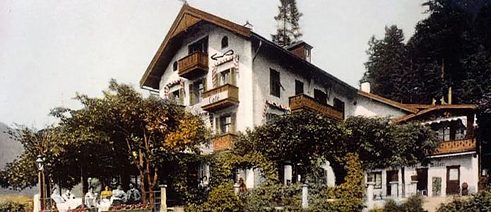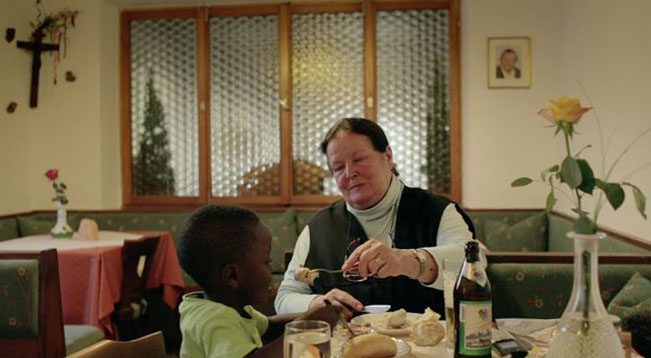Café Waldluft
There’s no place like home

Perched high on a hillside in the Bavarian Alps, in the shadow of Germany’s third highest peak, 'Café Waldluft' looms large over Berchtesgaden. The hotel is part of the mountainous town’s history — and it might just help shape its future. Built over a century ago, for decades it thrived as a popular and picturesque vacation destination filled with European tourists. During darker times, it was vacated due to its proximity to Hitler’s nearby summer residence. Now, for more than two years under long-term owner Flora Kurz, it has become a welcoming safe haven for asylum seekers.
In the documentary that shares the hotel’s name, first-time feature writer/director Matthias Koßmehl ponders these changes, with the latest resulting in “Mama Flora” — as she is dubbed by Café Waldluft’s inhabitants — initially receiving angry calls from local residents. Or, to view its contents not for their minutiae but for their universal relevance, the film contemplates whether the building is now fulfilling a better, more vital and fulfilling purpose. It was once a transient space of solace for people to escape normality before returning to their old lives; now, it’s a permanent new home for those fleeing unspeakable troubles in search of a better existence.
Stories of the motley crew
Without narration, and favouring flitting between crisp, scenic shots of the surrounding landscape and the contained sights of the hotel’s rustic interiors, Koßmehl wanders through the stories of the motley crew now living within its walls. Flora hails from Austria and came to Café Waldluft via marriage, while her cook Maria first ventured to the town from West Germany after the fall of the wall. They’re joined by refugees from Afghanistan, Syria, Sierra Leone and other conflict-afflicted countries, all settling in, helping out and doing what they can to move forward. Some wait to finalise German documentation, answering intrusive questions and biding their time as the wheels of bureaucracy turn slowly. Others anticipate the arrival of their family or plan their careers.Names aren’t offered, though some come up in conversation. Explanatory text is absent, with to-camera interviews providing relevant details. Historical data, about the place, and about everyone’s pasts, helps flesh out their plights — but, as intimate and revealing as some accounts prove, they also help paint a broader portrait. More concerned with experiences than identifying information, the film trawls through the thoughts, feelings, reflections and desires of Café Waldluft’s brethren, exploring what they each seek and share as they happily form a cosy, caring community.
A Film of Transformation
What does home mean to them? Or the concept of a homeland? Where do they want to belong? What — and where — does their heart yearn for? As everyone chats about their lives in segments weaved together as a series of juxtapositions, these questions come to the fore. Working through themes such as cultural memory, escaping oppression and defining their own lives, the documentary compiles the perspectives of Flora and the Waldluft’s longer-term residents, shifting to those who first made it their base out of necessity, and sometimes including discussions with locals or passing visitors. In the process, the resulting contrasts may remain obvious, but the various sections splice together organically to stress a lingering point. Each individual stems from a distinctive situation; however they’re all united in their searchfor home.
 Café Waldluft (2016)
| © Café Waldluft
Accordingly, Café Waldluft proves a film of transformation. A hotel that was once a holiday getaway becomes the starting point for a new beginning, while the documentary morphs from observational chronicle to thoughtful testament to the merits of openness and kindness. Indeed, in telling and finding commonalities in the tales of Flora and her fellow inhabitants, the feature mirrors comes to mirror efforts, quietly but effectively demonstrating how empathy can shine a light amidst pervasive darkness and hardship.
Café Waldluft (2016)
| © Café Waldluft
Accordingly, Café Waldluft proves a film of transformation. A hotel that was once a holiday getaway becomes the starting point for a new beginning, while the documentary morphs from observational chronicle to thoughtful testament to the merits of openness and kindness. Indeed, in telling and finding commonalities in the tales of Flora and her fellow inhabitants, the feature mirrors comes to mirror efforts, quietly but effectively demonstrating how empathy can shine a light amidst pervasive darkness and hardship.